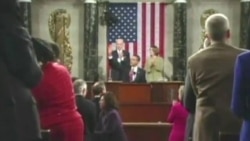As President Barack Obama prepares to deliver his annual State of the Union address, the US is facing several economic challenges. Despite signs of recovery, economic growth remains sluggish, government debt continues to rise, and millions of Americans are struggling to find jobs.
President Obama faces a far different economy than the one he inherited four years ago.
Although unemployment remains high, budget expert Stan Collender says the economy is gaining momentum..
"The housing market is different, the financial market, the stock market is double what it was when he took office, basically," Collender said.
While the risk of economic collapse is no longer the issue, analysts say the threat of fiscal breakdown is.
Despite averting a large tax hike for middle class Americans, Congress has only delayed the sequester - deep spending cuts mandated to force both parties to negotiate a deficit cutting deal.
Author and fiscal expert Charles Konigsberg says it's a terrible way to run a government.
"On March 1st, automatic budget cuts go into effect. They would cut both defense and non-defense programs by more than 5 percent, which could have a major impact on unemployment and on economic growth," Konigsberg said.
With no deal in sight, the president wants Congress to extend the deadline, again.
"If they can't get a bigger package done by the time the sequester is scheduled to go into effect, then I believe they should at least pass a smaller package of spending cuts and tax reforms that would delay the economically damaging effects of the sequester," Obama said.
The Congressional Budget Office says the automatic spending cuts would reduce the annual deficit. But they also would cut economic growth in half - and cost about one and a half million jobs.
House Speaker John Boehner, a Republican, expressed frustration over the stalemate.
"At some point, Washington has to deal with its spending problem. I've watched them kick this can down the road for the 22 years that I've been here. I've had enough of it. It's time to act," Boehner said.
With U.S. debt exceeding $16 trillion, both parties agree spending cuts are necessary. But economists say the cuts must be gradual. The economy shrank in the fourth quarter for the first time in three years -- the result, says Stan Collender, of a 22 percent cut in military spending.
"It's interesting because, after four years of Republicans talking about how spending cuts were going to spur economic growth, we now know for sure that just the opposite is true," Collender said.
Charles Konigsberg has worked in both Republican and Democratic administrations. He says how the president speaks to Republicans on Tuesday may be just as important as what he says.
"It's essential to bridge the gulf between the two parties -- and the only political figure who can do that is the president," Konigsberg
A nagging question is -- how much political capital is the president willing to expend to bridge a political divide that analysts say is, for now, the biggest drag on the world's largest economy.
President Obama faces a far different economy than the one he inherited four years ago.
Although unemployment remains high, budget expert Stan Collender says the economy is gaining momentum..
"The housing market is different, the financial market, the stock market is double what it was when he took office, basically," Collender said.
While the risk of economic collapse is no longer the issue, analysts say the threat of fiscal breakdown is.
Despite averting a large tax hike for middle class Americans, Congress has only delayed the sequester - deep spending cuts mandated to force both parties to negotiate a deficit cutting deal.
Author and fiscal expert Charles Konigsberg says it's a terrible way to run a government.
"On March 1st, automatic budget cuts go into effect. They would cut both defense and non-defense programs by more than 5 percent, which could have a major impact on unemployment and on economic growth," Konigsberg said.
With no deal in sight, the president wants Congress to extend the deadline, again.
"If they can't get a bigger package done by the time the sequester is scheduled to go into effect, then I believe they should at least pass a smaller package of spending cuts and tax reforms that would delay the economically damaging effects of the sequester," Obama said.
The Congressional Budget Office says the automatic spending cuts would reduce the annual deficit. But they also would cut economic growth in half - and cost about one and a half million jobs.
House Speaker John Boehner, a Republican, expressed frustration over the stalemate.
"At some point, Washington has to deal with its spending problem. I've watched them kick this can down the road for the 22 years that I've been here. I've had enough of it. It's time to act," Boehner said.
With U.S. debt exceeding $16 trillion, both parties agree spending cuts are necessary. But economists say the cuts must be gradual. The economy shrank in the fourth quarter for the first time in three years -- the result, says Stan Collender, of a 22 percent cut in military spending.
"It's interesting because, after four years of Republicans talking about how spending cuts were going to spur economic growth, we now know for sure that just the opposite is true," Collender said.
Charles Konigsberg has worked in both Republican and Democratic administrations. He says how the president speaks to Republicans on Tuesday may be just as important as what he says.
"It's essential to bridge the gulf between the two parties -- and the only political figure who can do that is the president," Konigsberg
A nagging question is -- how much political capital is the president willing to expend to bridge a political divide that analysts say is, for now, the biggest drag on the world's largest economy.








